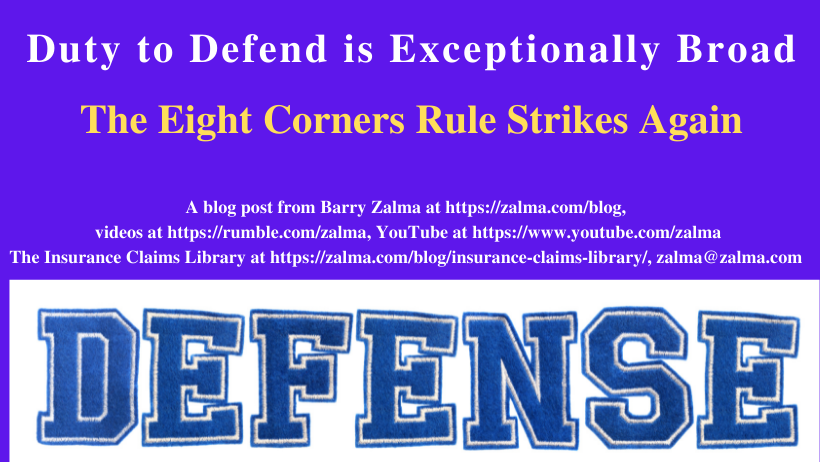-
News Feed
- EXPLORE
-
Pages
-
Groups
-
Events
-
Blogs
-
Marketplace
-
Offers
-
Jobs
-
Developers
Duty to Defend is Exceptionally Strong

The Eight Corners Rule Strikes Again
Posted on September 22, 2022 by Barry Zalma
See the full video at https://lnkd.in/dmYbJ4UQ and at https://lnkd.in/d2_HJaZz
M/I Homes of Chicago, LLC (M/I Homes), appealed from the circuit court’s entry of summary judgment in favor of Acuity, a mutual insurance company.
In Acuity v. M/I Homes Of Chicago, LLC, Court of Appeals of Illinois, First District, Sixth Division (September 9, 2022) the Illinois Court of Appeals resolved the dispute.
BACKGROUND
The Townhomes’ owners association sued for breach of contract. Acuity denied that it had a duty to defend M/I Homes under the policy and filed the declaratory judgment suit that is before the court.
The Policy
Acuity issued to H&R a fairly standard commercial general liability and commercial excess liability policy-policy. M/I Homes was listed as an additional insured on the Policy.
ANALYSIS
The construction of an insurance policy and a determination of the rights and obligations thereunder are questions of law for the court which are appropriate subjects for disposition by way of summary judgment. The duty to defend is determined solely from the allegations of the complaint. The duty to defend exists if the allegations in the underlying complaint fall within or potentially within a policy’s coverage provisions, even if the allegations are legally groundless, false, or fraudulent.
The Policy, which is a fairly standard commercial general liability (CGL) policy raises the question of M/I Home’s potential for coverage, and Acuity’s duty to defend, that hinges on whether the underlying complaint alleges “property damage” caused by an “occurrence.”
In Travelers Insurance Co. v. Eljer Manufacturing, Inc., 197 Ill.2d 278, 308 (2001), the supreme court held that, in determining whether there was CGL coverage.
The underlying complaint in this case contains allegations that could support an obligation to defend M/I Homes.
ZALMA OPINION
It is almost impossible to refuse to defend an insured based on lack of standing or property damage to property not involved in the loss. In this case the court found a duty to defend because there could be damage to the common property owned by the Association. Unless there is clear and convincing evidence that there is no coverage for defense or indemnity, demands for defense should be resolved with a reservation of rights including the right to demand return of monies paid for defense.
(c) 2022 Barry Zalma & ClaimSchool, Inc.
Barry Zalma, Esq., CFE, is available at http://www.zalma.com and [email protected].
Subscribe and receive videos limited to subscribers of Excellence in Claims Handling at locals.com https://lnkd.in/gfFKUaTf.
Subscribe to Excellence in Claims Handling at https://lnkd.in/gNm9EWKJ.
We are 100% funded for October.
Thanks to everyone who helped out. 🥰
Xephula monthly operating expenses for 2024 - Server: $143/month - Backup Software: $6/month - Object Storage: $6/month - SMTP Service: $10/month - Stripe Processing Fees: ~$10/month - Total: $175/month
- Art
- Causes
- Crafts
- Crime
- Dance
- Drinks
- Film
- Finance
- Fitness
- Food
- Games
- Gardening
- Health
- Home
- Literature
- Music
- Networking
- Paranormal
- Other
- Politics
- History
- News
- Party
- Science
- Religion
- Shopping
- Sports
- SyFy
- Politically Incorrect
- Philosophy
- Theater
- Technology
- Wellness



